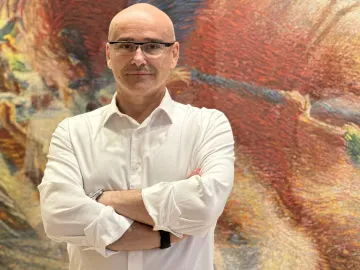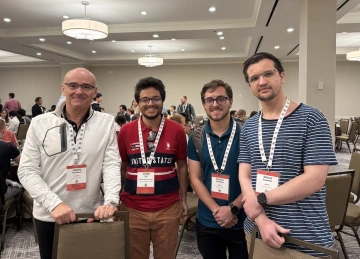Faculty Spotlight : Roberto Giacobazzi
Spotlight interview with Professor Roberto Giacobazzi

Roberto Giacobazzi is Professor in the Department of Computer Science at the University of Arizona. He is interested in programming languages and theory of computation. Before moving to Tucson, he was professor at the University of Verona (Italy) and Faculty at IMDEA Software Institute in Madrid (Spain).
Where are you originally from?
I am originally from Italy. Italy is known for its millenary culture, art and heritage, and contributed to the creation of among the oldest universities in the world. I grew up in a small village in northern Italy, near Modena. My father was a medical doctor and my mother a pharmacist. Although they both had scientific backgrounds, they shared a deep passion for classical studies. It was from them that I inherited my love for philosophy, history and science.
Growing up, what did you want to be?
I wanted to be a F1 pilot! Maybe because Modena is in the heart of the so called Motor Valley in Italy, where the Ferrari car maker was established after WWII. All young kids wanted to be F1 pilots there. At school I was way better in math than Latin or Literature, and after some years it became definitively clear that math was my elective field. Both my parents pushed me to follow my passions and interests from the very beginning, but it was my sister Margherita who suggested that I go to Pisa to see what was going on there around a relatively new discipline: Computer Science. It was 1982. At that time Pisa was the center of Computer Science in Italy and one of the very first departments established in this field in Europe. My parents bought me my first computer, a Sinclair Z80, and later a PC version of the Digital PDP-11—which, at the time, was indeed quite expensive. I immediately fell in love with programming, first in BASIC and then in Pascal. From that moment, the decision was clear: I had to go to Pisa!
What attracted you to academia?
My parents always told me that science—and research in particular—is the most beautiful profession one can pursue. During the years at the University of Pisa I had no clear idea of what to do, but when Prof. Giorgio Levi proposed to me after my BS to continue with a PhD under his supervision, I immediately accepted. It was the late 1980s, and Pisa was one of the leading centers for Logic Programming. Giorgio gave me the very first papers of Patrick and Radhia Cousot that in the late 70s introduced the idea of Abstract Interpretation as a general theory for program analysis. In abstract interpretation, the analysis and verification of programs is the result of a systematic process driven by the semantics of the programming language and the logic (abstraction) chosen to describe program properties. Giorgio’s ambition was to apply Abstract Interpretation to logic programs, and I was lucky to be at the right time in the right place!
Can you tell me a little about your research and what led you to your field?

I always worked in the field of abstract interpretation. After my PhD in 1993, I spent two years as postdoc in Paris, in the group of Patrick and Radhia Cousot where I learned the theoretical foundation of abstract interpretation. The greatest advantage of learning a method over a specific technique is that by knowing a method you are more flexible and you can explore an endless space of possible applications. During those years, I also met Francesco Ranzato, who had just begun his PhD and was spending a few months in Paris. We studied the mathematical foundations of abstract interpretation and, together, laid the groundwork for abstraction refinement within that framework—a collaboration that has remained consistently fruitful ever since. Specifically, my research deals with the study of the theoretical foundations of precision and imprecision in program analysis with applications in program analysis and verification, semantics, program transformation, and security.
What projects are you working on right now?
To cope with the undecidability of most properties of programs, sound static analyses approximate on the safe side. Abstract interpretation guarantees soundness but may lack completeness, meaning that false positives may be produced. Because the precision of the analysis depends upon the way the code is written, I am currently exploring the structure of models of computation (e.g., programming languages or, in the case of Quantum Computing, circuits) that guarantee precise (complete) abstract interpretations. Instead of refining the abstraction to remove false positives, we plan to make the code compliant with the abstract interpreter. The ambition is to lay the foundation of a new discipline of programming where the code can be efficiently and precisely verified by fixed analyzers. This is particularly important nowadays where code is produced by AI-assisted tools, thereby necessitating formal methods to rigorously assess its correctness. Compliance of code with respect to program analysis is a new, largely unexplored, frontier of programming that will provide the key technological advantage to make program analysis more widely used.
What do you enjoy most about your work?
To me, the thrill of discovery is one of the most profound joys life has to offer. When I see the solution of a problem, even if it is just sketchy or imperfect, I feel completely satisfied. I know that with some effort those sketchy proofs can be turned into some beautiful little theorems that unveil properties that before were unknown, and this is amazing. We are the astronomers of the universe of computation which is infinite and full of always new things to discover!
What advice would you give to an aspiring educator/researcher?
I always suggest my students to follow their passions and choose those problems that fulfill their ambitions. I firmly believe that besides the incredible applications of CS that we see nowadays, it is curiosity-driven research that truly drives innovation. The greatest achievements in science have been always made by true creative minds, and creativity is deeply related with passion and joy. In this mindset, publication is just the natural outcome.
How do you like to spend your free time?
I enjoy playing golf. I am a pretty bad golfer though, but what I like in golf is that you don’t have true adversaries, you play against your own limits. Just like in life, a great shot can be immediately followed by a terrible one—and in my case, that’s more the rule than the exception.
What would people be surprised to learn about you?
I enjoy philosophy and history, so if anyone’s up for a conversation on these topics, I’m always available!

